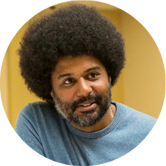November Expert Panel: Re-Imagining Equity Paths for the Next Generation of Maker Teaching and Learning
Overview Blog Playlist Expert Panel Discussion Resources Synthesis Brief
Download: Webinar Chat
Recorded: November 28, 2022
Description: Recent developments in computing and bio technologies have had unprecedented impacts on contemporary education—broadening participation and spurring innovation pipelines. In addition, the Maker movement appears to be a promising space and theoretical vantage point to explore teaching and learning in areas where creativity, personal interests, and production are central parts of engagement. Last, recent scholarship has rightfully problematized the risks that emerge when issues of equity are not emphasized at the forefront of learning experience designs. This session will explore these issues in the context of next-generation technology-driven making, to identify paths in future research and practice that might support productive and critical assessments of technology, increasing the collective impact on teaching and learning.
MODERATOR AND PANELIST BIOS

Justice Walker is a learning scientist, assistant professor of STEM education, and Principal Investigator of the ABC Learning Lab—a research group at the University of Texas at El Paso College of Education that studies emerging technologies in biology and computer sciences and their use in K-12 education. He leads work developing and deploying curriculum activities to study their impact on student learning. His recent work focuses on how middle and high school students learn when they design and construct with biology. He is also currently leading a research initiative to bring culturally relevant computer science-based data science to high school learners. His work in computer science education has been consistently funded by the National Science Foundation. Walker holds a Ph.D. from the University of Pennsylvania (UPenn) Graduate School of Education, and M.S. in Engineering from the UPenn School of Engineering and Applied Science and a B.S. in Molecular Biology and English Literature from the University of Miami (FL).
>> View Justice Walker's Video
Panelists:

Yasmin B. Kafai is Lori and Michael Milken President’s Distinguished Professor, Graduate School of Education at the University of Pennsylvania where she design and researches of online tools and communities to promote coding, crafting, and creativity across grades K–16. Her work empowers students to use computer programming to design games, sew electronic textiles, and grow applications in biology with the goal of supporting creative expression, building social connections, and broadening participation in computing.

Christopher G. Wright, Ph.D., is an Associate Professor of STEM Education in the Department of Teaching, Learning, & Curriculum (TLC) at Drexel University. Christopher is also Co-Founder and Co-Director of the In/formal Learning Linking Engineering, Science, & Technology Lab (The ILLEST Lab). Christopher’s research focuses on reimagining, designing, and studying STEM learning environments that affirm, cultivate, and build upon the cultural, linguistic, and intellectual resources that young people bring to engaging in engineering, science, and making. Understanding that learning in k-12 contexts inevitably takes place at powered boundaries of culture, race, class, & language, this research highlights the experiences of those from communities that have been historically excluded from engineering and science. Specifically situated research that privileges asset-based frameworks, Christopher utilizes a variety of research methodologies, including the (a) deployment of critical ethnographic methodologies for exploring and uncovering rich intellectual and linguistic resources that Black children draw upon while engaging in and navigating STEM spaces and (b) design and study of model STEM learning environments that support learning and identity development.
>> View Christopher Wright's Video

Anja Scholze, Ph.D., is the Program Director for Biology + Design at The Tech Interactive, where she leads a team that imagines and develops experiences to empower everyone to explore biology as a creative and problem solving medium. She co-created the award-winning BioDesign Studio permanent exhibition and is director of The Biotinkering Lab, an experimental museum space at the intersection of technology, design, biology, and making. She holds a B.A in Neuroscience from Pomona College and a Ph.D. in Developmental Biology from Stanford University.

Dr. Eli Tucker-Raymond is research associate professor at BU Wheelock College of Education & Human Development, affiliated with the Earl Center for Learning & Innovation. His research focuses on creating and understanding humanizing spaces for learners at the intersection of STEM, literacy, and the media/arts. He is particularly interested in spaces that promote racial equity and critical, compassionate relationships between educators and learners. He is currently PI of a network (https://craft-network.org/) dedicated to bringing together researchers and practitioners at the intersections of making and criticality.
>> View Eli Tucker-Raymond's Video